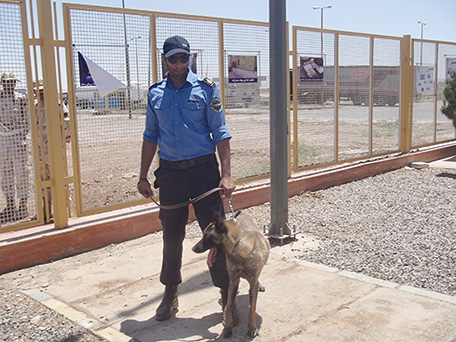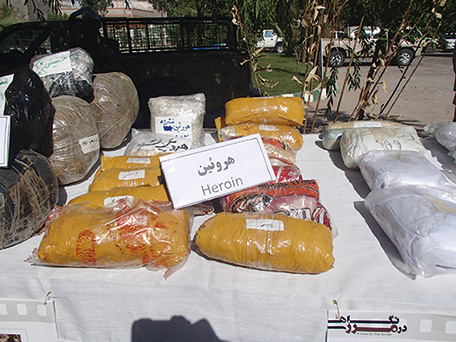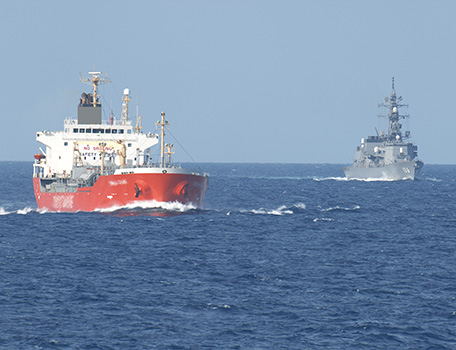(6) Transnational Organized Crime and Terrorism
Globalization, the advancement and proliferation of high-tech devices, and expanded mobility has turned transnational organized crime and terrorism into a threat to the entire global community. In recent years, transnational organized crime, to include illicit drug trafficking, trafficking of firearms, trafficking in persons, cybercrime, and money laundering*, has become increasing sophisticated in its methods. Not only are groups, which are affiliated with and influence by Al-Qaeda and other international terrorist organizations, becoming increasingly active in Africa and the Middle East, but also individual acts of terrorism, influenced by violent extremism, as well as foreign terrorist fighters pose a grave threat. In addition, piracy off the Coast of Somalia and in the Gulf of Aden in eastern Africa remains a concern.
There are limitations for any one nation in effectively dealing with transnational organized crime, acts of terrorism, and piracy. Therefore, not only must each nation strengthen its countermeasures in each respective area, but the entire international community must work together to eliminate legal loopholes in the international system through efforts in criminal justice and law enforcement capacity building assistance in developing countries.
< Japan's Efforts >
| Counter-Narcotics

A drug-sniffing dog purchased with the contributions from Japan to UNODC. (The national border of Iran and Afghanistan)

Heroin seized by the Government of Iran at the national border of Iran and Afghanistan. (Photo: Both by Hiroshi Fumoto / Embassy of Japan in Iran)
Alongside Japan's active participation in the United Nation's Commission on Narcotic Drugs, Japan also contributes to the United Nation International Drug Control Programme (UNDCP) fund, which is part of the United Nations Office on Drugs and Crime (UNODC), to support the counter-narcotics efforts primarily in Southeast Asian countries and Afghanistan. $500,000 to the UNDCP fund for projects and implemented various activities and projects, such as: monitoring of the status of illegal production of poppies (plants grown as ingredients for the drug opium) in Myanmar; analysis of trend surveys in synthetic drugs in Southeast Asia and other areas; capacity building of law enforcement authorities in the West Africa region on the bases of the situation in which an increasing amount of methamphetamine has been manufactured and smuggled into Japan in recent years. Japan contributed $ 5 million to support counter-narcotics measures (e.g., border control, alternative development, drug abuse prevention) in Afghanistan, which is the world's largest illegal producer of poppies and poses a serious issue to the international community, and neighboring countries.
| Measures Against Trafficking in Persons
With regard to measures against trafficking in persons, Japan provides assistance to prevent trafficking, help victims, and contribute to capacity building of law enforcement agencies. Japan also provides support for the repatriation and social reintegration of foreign trafficking victims who were identified in Japan.
Concerning the victims of trafficking in persons, Japan provides assistance through contribution to the International Organization for Migration (IOM) for the safe repatriation of victims of trafficking and their reintegration in their home countries, who are under protection in Japan. Moreover, Japan provides support for the “Bali Process,” which is a framework on people smuggling, trafficking in persons, and transnational crime in the Asia-Pacific region.
Furthermore, Japan has thus far provided beneficial support to measures combating trafficking in persons through the Grant Assistance for Grass-Roots Human Security Projects (Thailand and Myanmar) as well as technical cooperation in Thailand, Myanmar, and Viet Nam.
| Measures Against Corruption
As part of its efforts combating corruption, Japan contributed $200,000 to the Crime Prevention and Criminal Justice Fund (CPCJF) of the UNODC in FY2013. In addition, Japan continues to strengthen measures against corruption through capacity building of government officials in Southeast Asia, and extends support by promoting asset recovery* in Middle Eastern countries, which are in the process of democratization.
In addition, through the United Nations Asia and Far East Institute for the Prevention of Crime and the Treatment of Offenders (UNAFEI), Japan held an International Training Course on the Criminal Justice Response to Corruption on the theme of “Effective Prevention and Detection of Corruption Cases and Public-Private Cooperation” for criminal justice professionals in developing countries, mainly in the Asia-Pacific region. For this International Training Course, themes have been selected from the key issues of the United Nations Convention against Transnational Organized Crime (UNTOC) and the United Nations Convention against Corruption (UNCAC) in order to contribute to the sound development of the criminal justice system and the strengthening of cooperative relationships in each country. Likewise, Japan has been holding an annual seminar called “Regional Seminar on Good Governance for Southeast Asian Countries” since 2007, with the objective of supporting efforts to establish “rule of law” and “good governance” in Southeast Asian countries and contributing to human resources development in the area of criminal justice and corruption response. In 2013, a seminar was held in Kuala Lumpur, Malaysia, on the theme of “Enhancing Investigative Ability in Corruption Cases.”
| Measures Against Cybercrime
Japan promotes international coordination with the aim of dealing with increasing cases of cybercrimes. In particular, Japan works on the capacity building assistance for judicial and law enforcement agencies in the Asia-Pacific region. In FY2013, Japan contributed $150,000 to CPCJF, and in collaboration with the United States, supported efforts to improve the ability of Southeast Asian countries to tackle cybercrimes.
| Counter-Terrorism
The international community must make every effort to prevent the means of terrorism from falling into the hands of terrorists, deny them safe havens, and overcome vulnerabilities to acts of terrorism. To assist the international communities' efforts, Japan provides capacity building assistance to those developing countries, which are not equipped with sufficient capabilities. Japan has also intensified its support for counter-terrorism measures taken in developing countries since the establishment of the Grant Aid for Cooperation on Counter-Terrorism and Security Enhancement in 2006.
For Japan, preventing terrorism and ensuring security in the Southeast Asian region, with which Japan has a close relationship, as well as in North Africa and the Sahel region near Algeria, where a terrorist attack occurred against Japanese nationals residing in the country, have a particular significance. Thus, Japan has strengthened its effort into its support for these regions. Specifically, Japan implements a variety of support such as providing equipment, dispatching experts, hosting seminars and accepting trainees in various different fields including immigration control, aviation security, port and maritime security, cooperation with customs, export control, cooperation for law enforcement, measures against terrorist financing (measures to cut off the flow of money towards terrorists and terrorist organizations) and the promotion of completing international counter-terrorism conventions and protocols.
Japan has been stepping-up its engagement in international counter-terrorism efforts following the terrorist incident in Algeria in January 2013. At TICAD V held in June 2013, Japan announced that it will support the enhancement of the counter-terrorism capabilities of those countries in North African and the Sahel region, including the development and equipping of 2,000 counter-terrorism personnel, as well as ¥100 billion in development and humanitarian assistance to contribute to the regional stability in the Sahel region. Specifically, with the cooperation of international organizations, including UNODC and the United Nations Development Programme (UNDP), Japan provides supports for countries in North Africa and the Sahel region to conduct drills and trainings for strengthening police and border control capacities, improving security capacity through PKO training centers, and for reinforcing the judiciary system.(Note 16) In October 2013, Japan supported the dispatch of a study mission by the African Center for Studies and Research on Terrorism. Furthermore, in February 2014, Japan decided to support Egypt and Iraq by strengthening the counter-terrorism legislation through UNODC.
| Actions Against Piracy
As a maritime nation, Japan depends largely on maritime transport for the import of energy resources and food. Counter-piracy measures for ensuring the safety of navigation of vessels are issues involving a direct link to Japan's prosperity and existence as a nation. Furthermore, maritime safety is an essential prerequisite for the economic development of the region.
In recent years, many incidents of piracy(Note 17) occurred off the coast of Somalia and in the Gulf of Aden in Eastern Africa, while the number of pirate attacks fell sharply from 237 in 2011 to 75 in 2012 and 15 in 2013 as a result of the efforts by the international community. Despite the decrease in incidents of piracy, the root causes that spawn piracy have not been addressed, including the issues of poverty and unemployment among young people in Somalia. Moreover, Somalia transitioned from the Transitional Federal Government to Federal Government recently, in August 2012, and still lacks adequate capacity to independently crack down on piracy. Considering the fact that the crime organizations that conduct acts of piracy have not been eradicated, the situation still requires caution. If the international community relaxes its efforts, the situation could easily reverse.

A destroyer protecting a ship traveling off the coast of Somalia and in the Gulf of Aden. (Photo: The Ministry of Defense)
As part of the initiatives to deal with the issue of piracy off the coast Somalia, Japan has been implementing counter-piracy measures, such as deploying two destroyers and two P-3C maritime patrol aircraft of the Maritime Self-Defense Force to conduct escort activities for commercial ships and surveillance activities targeting pirates, based on the Act on Punishment and Countermeasures against Piracy enacted in June 2009. Japan Coast Guard law enforcement officers are also on destroyers to make arrests, question detainees and perform other duties of judicial law enforcement activities when acts of piracy are committed.
Resolving the Somali piracy problem requires enhancement of the maritime law enforcement capabilities of coastal countries and multilayered efforts aiming for the stabilization of the situation in Somalia, which is of particular relevance to the expansion of piracy activities, in addition to the abovementioned activities on the sea. As part of these efforts, Japan contributed a total of $14.6 million to the IMO Djibouti Code of Conduct Trust Fund, which was founded by the International Maritime Organization (IMO)(Note 18) to implement the Djibouti Code of Conduct (a regional framework for improving capabilities for maritime law enforcement in Somalia and its neighboring countries), which is promoted by the IMO. This Trust Fund has been used to upgrade and operate information-sharing centers for anti-piracy measures in Yemen, Kenya and Tanzania, and to establish a Djibouti Regional Training Center, which is presently under construction. Currently, the IMO is also conducting training programs to improve maritime security capabilities in countries surrounding Somalia.
In addition, Japan has contributed a total of $3.5 million to the Trust Fund to Support Initiatives of States Countering Piracy off the Coast of Somalia. Its purpose is to assist Somalia and its neighboring countries improve their capabilities, in order to arrest and prosecute alleged pirates. Japan has been supporting the international community striving to arrest and prosecute, and prevent the reoccurrence of piracy. In addition, in cooperation with the Japan Coast Guard, Japan has carried out training programs for the control of maritime crime, inviting maritime security officers from the countries around Somalia. Furthermore, since 2007, Japan has disbursed approximately $323.1 million to Somalia in assistance to strengthen domestic security, provide humanitarian assistance, and develop the infrastructure within Somalia, in order to bring peace to Somalia.
- *Money laundering
- Money laundering refers to the act of disguising funds or proceeds obtained from criminal activities as legally obtained assets, or the act of hiding such funds. For example: An act where a drug dealer hides money obtained through drug transactions in a bank account opened under a false name.
- *Asset recovery
- Asset recovery is a measure by which countries freeze and confiscate revenue from corrupt practices that have flowed out of the country through the illegal activities of a former dictator, etc. and return it to their country of origin. It is part of international cooperation in the anti-corruption field.
- Note 16: See “The Project for Strengthening Criminal Justice and Law Enforcement Capacities in the Sahel Region”
- Note 17: Typically, pirates off the coast of Somalia and in the Gulf of Aden attack a ship navigating in the water with automatic rifles and rocket launchers, take control of the ship, and demand ransom for the safe release of the crew.
- Note 18: On January 1, 2012, former IMO Maritime Safety Division Director Koji Sekimizu assumed the position of IMO Secretary-General.
